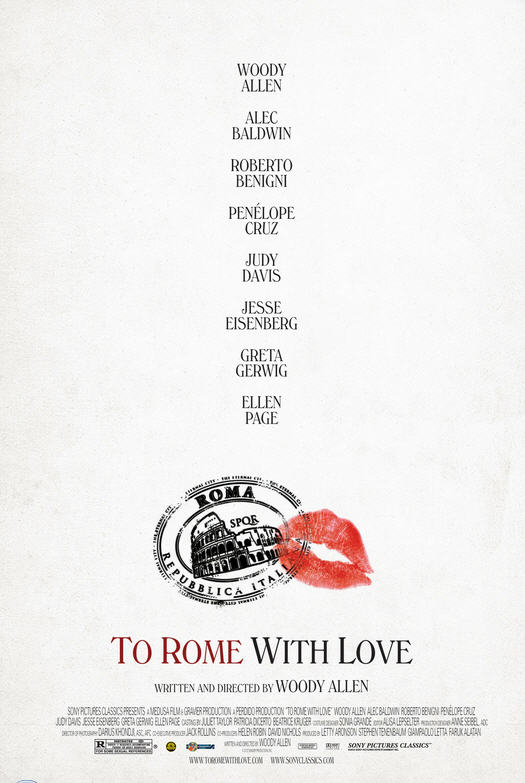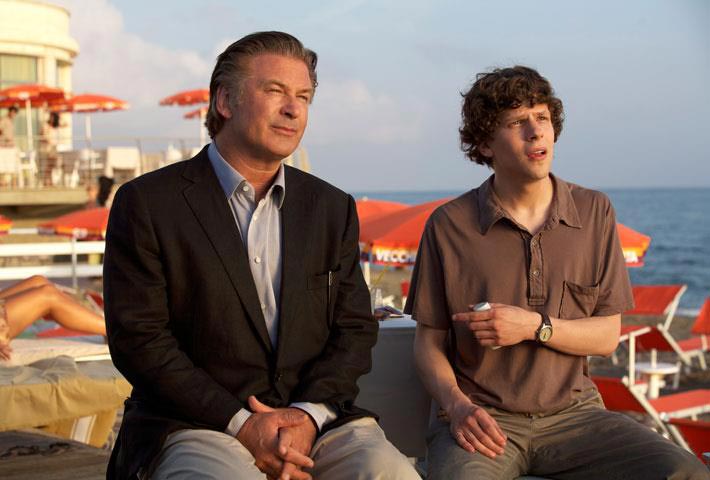
Director: Woody Allen
Writer: Woody Allen
The title suggests an intimate dedication from a director who has fallen for the charms of a city. Manhattan and Midnight in Paris—these films are love letters, to New York City and Paris respectively. Woody Allen's latest film, To Rome with Love, is more of a postcard—something you quickly peruse before storing in a drawer, never to be seen again. Throughout the past seven years, Allen has broken away from the confines of New York and shown us the offerings of London (most notably in Match Point), Barcelona (Vicky Cristina Barcelona) and Paris (Midnight in Paris). Now, Allen's given us a travelogue set in Rome. The old saying goes "When in Rome, do as the Romans do." Going by this proverb, you would assume that the Romans make clumsy films, because this film is a disappointing misfire.

So, what is this film actually about? To be honest, everything's a muddle in my head, but with the assistance of what's already been written about the film, I'll do my best. Hayley (Alison Pill) is an American tourist who falls in love with and becomes engaged to Italian lawyer Michelangelo (Flavio Parenti). Hayley's parents, Jerry (Woody Allen) and Phyllis (Judy Davis), fly to Rome to meet their daughter's fiancé and his parents. Jerry hears Michelangelo's father, Giancarlo (Fabio Armiliato), singing in the shower one day and hopes to make him a worldwide sensation. Another story arc sees Alec Baldwin as John, an esteemed architect who is visiting Rome with his wife and some friends. It's been around 30 years since John lived in Rome, and he's keen to revisit his old haunts. He meets Jack (Jesse Eisenberg)—an aspiring American architect, and boyfriend of Sally (Greta Gerwig). Sally's best friend, Monica (Ellen Page), is invited to stay with Jack and Sally following a rough breakup, and bonds with Jack over architecture and literature. Throughout the film, John will become an extension of Jack's consciousness and offer him relationship advice. Meanwhile, Antonio (Alessandro Tiberi) and Milly (Alessandra Mastronardi) are newlyweds who have just settled in Rome. Milly is starstruck to see her favourite movie stars in the Roman streets, while Antonio becomes involved with Anna (Penélope Cruz), a prostitute who mistakes him for a client. The other storyline that rounds out the film is concerned with Leopoldo (Roberto Benigni), who wakes up one morning as a national celebrity, but has no idea why. He is essentially famous for being famous.
Allen is thus tasked with juggling four story arcs, and at least double the amount of important characters. Actually, I shouldn't use the word 'tasked', as Allen brought this upon himself. The result is a mess—an uneasy series of people and predicaments that rarely provide the opportunity for empathy. The film lacks an emotional centre, as Allen weaves in and out of these characters' lives with reckless abandon. Some would call this approach 'spontaneous'. I beg to differ. It's just plain jumpy. For those playing at home, a film that ties many lives together very nicely is Miranda July's Me and You and Everyone We Know. When the most engaging character in a film is the city it's set in, you've got problems. Notice how I used the word 'engaging'. The problem is not that these characters are bland. Quite a few are interesting, but just as we begin to warm to them, Allen switches to a different vignette. If he wanted to, Allen could have separated each story arc into an individual film. This film just feels as though it wants to burst through the screen and offload some characters into the audience. It has enough to spare.

It was nice to see Woody Allen in his first acting role since Scoop in 2006. I wouldn't say that he stole the show (my personal vote for that role goes to Alec Baldwin with his quick wit), but he was always entertaining. I do think he overacted in some scenes, and tried too hard to be THE Woody Allen character everyone knows so well (for example, when his character is complaining about turbulence on the flight to Rome). In this sense, he descended into self-parody, but it didn't detract from my enjoyment of his scenes. It wouldn't be a Woody Allen film if the theme of death was not prevalent, and To Rome with Love is no exception. A recurring notion throughout the film is that of "Ozymandias melancholia", or the sinking realisation that nothing in life is permanent. Jerry remarks that he hates the idea of retirement because it's essentially analogous with death, and we get the feeling that this is Allen using his character to voice a personal statement.
So, does To Rome with Love signal the decline of Woody Allen as a filmmaker? Certainly not. Keep in mind that this man has averaged one film per year since 1969 (because stagnation triggers thoughts about his mortality). There are bound to be some average or below par films in a career that is so prolific. Not every one will be a success. I think this film is a product of pragmatism. Having made films in London, Barcelona and Paris, it was only logical that a film in Rome would have to follow. Indeed, this film is largely imbued with Italian sensibilities. It doesn't feel as though Allen is an American director making a film in Italy, but rather that Allen is an Italian director. He has an excellent knowledge of how to channel the styles of other cultures. Could it be that Allen is simply running out of ideas? The Roberto Benigni storyline in this film is a well-travelled one, and Allen himself addressed the pros and cons of fame in Celebrity, where he argued that the positives of being famous far outweigh the negatives. But who does Woody Allen make films for? In the past, he has said that he can't identify his audience, and refuses to believe his films naturally attract intellectuals. I believe he makes them for himself, more than anything—not because he is egocentric, but because of that constant need to always be working. And if, like Jack, you are always working and never playing, you can very easily become a dull boy.
2.5/5 stars.
No comments:
Post a Comment